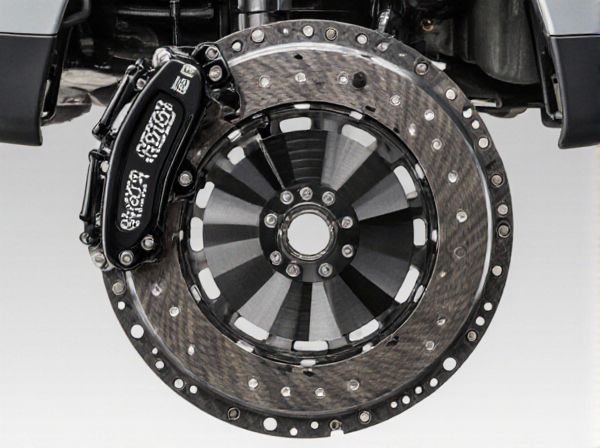
Photo illustration: Carbon Clutch vs Metallic Clutch
A carbon clutch offers superior heat resistance and durability compared to a metallic clutch, making it ideal for high-performance or racing applications. Metallic clutches provide reliable engagement and are generally more affordable, suitable for everyday driving and standard vehicles. Choosing the right clutch depends on your driving style and the demands placed on your vehicle's transmission system.
Table of Comparison
| Feature | Carbon Clutch | Metallic Clutch |
|---|---|---|
| Material | Carbon fiber composite | Metal alloy (steel, iron) |
| Heat Resistance | High, up to 800degC | Moderate, up to 400degC |
| Durability | Long lifespan, wear-resistant | Moderate lifespan, prone to wear |
| Performance | Consistent engagement, smooth shifts | Good for daily driving, less smooth |
| Cost | Higher initial cost | Lower initial cost |
| Weight | Lightweight | Heavier |
| Ideal Use | High-performance, racing cars | Standard vehicles, daily driving |
Introduction to Carbon and Metallic Clutches
Carbon clutches feature carbon fiber friction discs known for their lightweight, high heat resistance, and consistent performance under extreme conditions, making them ideal for high-performance and racing applications. Metallic clutches utilize steel or other metal-based friction materials, offering greater durability and torque capacity but often generate more heat and wear compared to carbon variants. Understanding the material composition and thermal properties of each clutch type is crucial for selecting the best option based on vehicle performance requirements and operating environments.
Composition and Material Properties
Carbon clutches consist of composite materials with carbon fiber reinforced matrices offering superior heat resistance, lightweight characteristics, and consistent performance under high thermal stress. Metallic clutches are primarily made from steel alloys or sintered metals that provide high friction coefficients, durability, and resistance to abrasion but tend to be heavier and generate more heat during operation. The carbon clutch's low density and thermal conductivity make it ideal for high-performance applications, while metallic clutches are preferred for their robustness in heavy-duty environments.
Performance Comparison: Carbon vs Metallic
Carbon clutches deliver superior heat resistance and quicker engagement compared to metallic clutches, making them ideal for high-performance applications such as racing and heavy-duty vehicles. Metallic clutches provide better durability and cost-effectiveness but tend to overheat and wear faster under extreme stress. The choice between carbon and metallic clutch systems depends on balancing performance requirements with longevity and budget constraints.
Heat Resistance and Thermal Management
Carbon clutches offer superior heat resistance compared to metallic clutches due to their ability to withstand higher temperatures without degrading, making them ideal for high-performance and racing applications. Their advanced thermal management properties enable efficient heat dissipation, reducing the risk of overheating and maintaining consistent friction levels. Metallic clutches, while durable, tend to absorb and retain heat more, increasing the likelihood of heat fade and reduced performance under extreme thermal conditions.
Durability and Longevity
Carbon clutches typically offer superior durability and longevity compared to metallic clutches due to their high resistance to heat and wear during repeated engagement cycles. The carbon material maintains friction stability under extreme temperatures, reducing the risk of glazing and material degradation over time. Metallic clutches, while robust in construction, tend to wear faster under heavy use because metal-on-metal contact generates higher heat and accelerates component fatigue.
Weight and Rotational Inertia
Carbon clutch plates weigh significantly less than metallic clutch plates, reducing overall vehicle weight and improving performance. The lower mass of carbon clutches results in decreased rotational inertia, enabling faster engine response and quicker acceleration. In contrast, metallic clutches have higher rotational inertia due to their heavier components, which can slow down throttle response and impact handling dynamics.
Cost Analysis and Affordability
Carbon clutches typically have a higher upfront cost than metallic clutches due to advanced composites and manufacturing complexity, making them less affordable for budget-conscious consumers. However, carbon clutches offer superior longevity and heat resistance, reducing replacement frequency and long-term expenses. Metallic clutches present a lower initial investment but may incur higher maintenance and replacement costs over time, affecting overall cost efficiency.
Applications in Motorsports and Daily Driving
Carbon clutches excel in high-performance motorsports due to their superior heat resistance, lightweight design, and ability to handle extreme torque loads, making them ideal for racing cars and track use. Metallic clutches offer durability, cost-effectiveness, and smoother engagement, which suits daily driving by providing reliable performance in stop-and-go traffic and varying road conditions. Choosing between carbon and metallic clutches depends on the application's demands for heat tolerance, longevity, and driving style.
Maintenance Requirements and Service Life
Carbon clutches exhibit longer service life and require less frequent maintenance compared to metallic clutches due to their superior heat resistance and wear characteristics. Metallic clutches typically experience faster wear and require more regular inspection and replacement of components such as friction plates and springs. The cost efficiency of carbon clutches improves over time despite higher initial investment, as reduced maintenance intervals lower overall downtime and repair expenses.
Choosing the Right Clutch for Your Needs
Choosing the right clutch depends on your vehicle's performance requirements and driving conditions. Carbon clutches offer lightweight construction and superior heat resistance, making them ideal for high-performance and racing applications. Metallic clutches provide durability and strength for heavy-duty use, making them suitable for daily driving and towing tasks.
 caratoz.com
caratoz.com